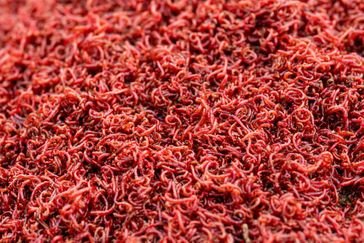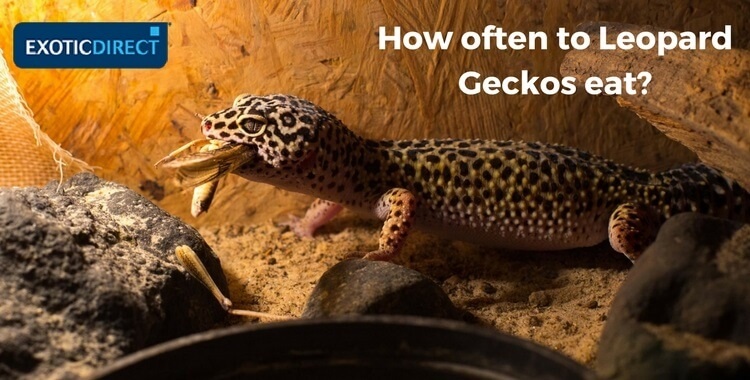Can Leopard Geckos Eat Bloodworms

Leopard geckos are a type of lizard that is native to Pakistan, India, and Afghanistan. They are nocturnal animals that prefer to live in dry, rocky habitats. Leopard geckos are relatively small lizards, reaching a length of about 8-10 inches when fully grown.
These lizards have specialized toe pads that help them climb vertical surfaces and catch their prey. Their diet consists mainly of insects, but they will also eat other small animals such as snakes and rodents. Bloodworms are a type of larvae that lives in the blood of mammals.
These creatures are not actually worms, but they do have a long, segmented body similar to a worm. Bloodworms get their name from the fact that they feed on the blood of their hosts.
Yes, leopard geckos can eat bloodworms. Bloodworms are a type of larvae that live in fresh or salt water and are often used as fish bait. They are an excellent source of protein for leopard geckos and other reptiles.

Credit: www.exoticdirect.co.uk
What Kind of Worms Can Leopard Geckos Eat?
There are a variety of worms that leopard geckos can eat, including mealworms, superworms, and waxworms. All of these worms are high in protein and fat, which is essential for leopard geckos. Mealworms and superworms should make up the bulk of their diet, with waxworms being fed as an occasional treat.
What Food is Toxic to Leopard Geckos?
Leopard geckos are a type of reptile that is native to parts of Asia and Africa. These creatures are nocturnal, meaning they are most active at night. Leopard geckos are relatively small, reaching an average length of about 10 inches.
They are also known for their spotted patterned skin, which helps them to camouflage in their natural habitats.Leopard geckos are popular pets due in part to their docile nature and lack of aggressive behavior. However, there are still some things potential owners should know before bringing one home.
For example, leopard geckos have specific dietary needs and there are certain foods that can be toxic to them.One food item that is toxic to leopard geckos is garlic. Garlic belongs to the Allium family of plants, which also includes onions, chives, and shallots.
These plants contain compounds that can be harmful to reptiles when consumed in large quantities. Studies have shown that ingesting garlic can lead to anemia and damage the liver or kidneys in reptiles like leopard geckos.Other food items that should be avoided include avocado and chocolate.
Both of these foods contain substances called persin and theobromine respectively, which can be poisonous to leopard geckos if ingested in large amounts. Symptoms of toxicity from either food may include vomiting, diarrhea, lethargy, or difficulty breathing; if your pet displays any of these symptoms after eating either avocado or chocolate it is important to seek professional medical help right away as they could be very serious.
Can I Feed My Leopard Gecko Red Worms?
As a rule of thumb, you should avoid feeding your leopard gecko any insects that are red in color. This is because many of these insects are poisonous and can make your gecko very sick. However, there are a few exceptions to this rule.
Red worms, for example, are safe for leopard geckos to eat and can actually be quite nutritious for them. If you’re looking to add some variety to your gecko’s diet, red worms can be a great option. Just be sure to purchase them from a reputable source and offer them in moderation.
Can Leopard Geckos Eat Frozen Worms?
Yes, leopard geckos can eat frozen worms. Some people choose to feed their leopard geckos live food, but this is not necessary. If you do choose to feed your leopard gecko live food, you can purchase live insects from a pet store or breed them yourself.
However, it is important to remember that any time you feed your leopard gecko live food, there is a risk of the insect biting your gecko. If you are concerned about this, you can opt to feed your leopard gecko frozen insects instead. Frozen insects are just as nutritious as live ones and they come with zero risk of being bitten.
What Can Leopard Geckos Eat? | FEEDING ALL MY GECKOS
Can Leopard Geckos Eat Worms
As leopard geckos are insectivores, they should primarily be fed insects. However, you may occasionally offer your leopard gecko a worm as a treat. When choosing a worm to feed your leopard gecko, avoid those that have been treated with pesticides or other chemicals.
The best type of worm to feed your leopard gecko is the mealworm. Mealworms can be purchased live or frozen from most pet stores.To prepare the mealworms for your leopard gecko, simply place them on a cutting board and cut them into small pieces with a sharp knife.
You can then offer them to your leopard gecko one at a time using forceps or tweezers. Some leopard geckos will readily accept worms as part of their diet, while others may not be as interested. If you find that your leopard gecko isn’t eating the worms, you can try dusting them with calcium powder before offering them again.
Can Bearded Dragons Eat Bloodworms
Bearded dragons are a type of lizard that is native to Australia. They are popular pets because of their docile nature and ease of care. Bearded dragons are omnivorous, meaning they will eat both plants and animals.
Their diet in the wild consists mostly of insects, but they will also eat small mammals, reptiles, and birds. In captivity, bearded dragons can be fed a diet of vegetables, fruits, insects, and commercial bearded dragon food pellets.One type of food that bearded dragons enjoy eating is bloodworms.
Bloodworms are the larvae of midge flies and are commonly used as fish bait. They get their name from their red coloration, which comes from the hemoglobin in their bodies. Bloodworms are high in protein and fat, making them an excellent food source for bearded dragons.
However, they should only be fed as a occasional treat due to their high fat content.
Can Leopard Geckos Eat Fish
Yes, leopard geckos can eat fish. In fact, fish are a great source of protein for these lizards. When choosing a fish to feed your leopard gecko, make sure it is appropriately sized and not too big for them to eat.
You’ll also want to avoid giving them fish that has been deep fried or breaded, as this can be unhealthy for them.
Can Leopard Geckos Overeat if They Eat Too Many Bloodworms?
Leopard gecko overeating habits can lead to health issues. While bloodworms are a nutritious food source, excessive consumption can cause obesity, digestive problems, and even impact their lifespan. It’s crucial to monitor their intake and provide a balanced diet to ensure the well-being of these fascinating reptiles.
Can Leopard Geckos Eat Shrimp
Leopard geckos are a popular pet reptile, and they are known to be voracious eaters. So, can leopard geckos eat shrimp?The answer is yes!
Leopard geckos can safely eat shrimp as part of their diet. In fact, shrimp is a great source of protein for these reptiles.When feeding shrimp to your leopard gecko, it is important to offer only small pieces that the reptile can easily digest.
Avoid giving your leopard gecko large pieces of shrimp, as this could cause an intestinal blockage.
Conclusion
Leopard geckos are a type of lizard that is native to parts of Asia and Africa. They are popular pets in the United States and many people choose to feed them bloodworms as part of their diet. While bloodworms can be a nutritious food source for leopard geckos, there are some potential risks associated with feeding them to these lizards.
This article will discuss some of the pros and cons of feeding bloodworms to leopard geckos so that you can make an informed decision about whether or not this is the right food for your pet.One of the main benefits of feeding bloodworms to leopard geckos is that they are an excellent source of protein. Bloodworms are high in iron and other minerals which can help keep your leopard gecko healthy and strong.
Another benefit is that bloodworms are very easy to digest, so they are a good option for lizards who may have trouble digesting other types of food. One potential downside of feeding bloodworms to leopard geckos is that they can sometimes carry diseases, so it is important to only purchase them from reputable sources. Additionally, because they are high in iron, it is important not to overfeed your leopard gecko bloodworms as this could lead to health problems.
If you decide to feed bloodworms to your leopard gecko, be sure to do so in moderation and always purchase them from a reliable source.